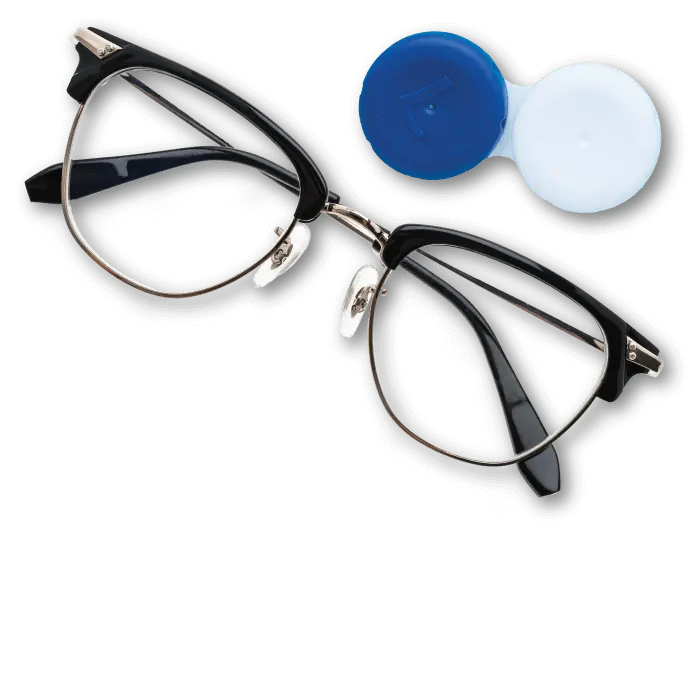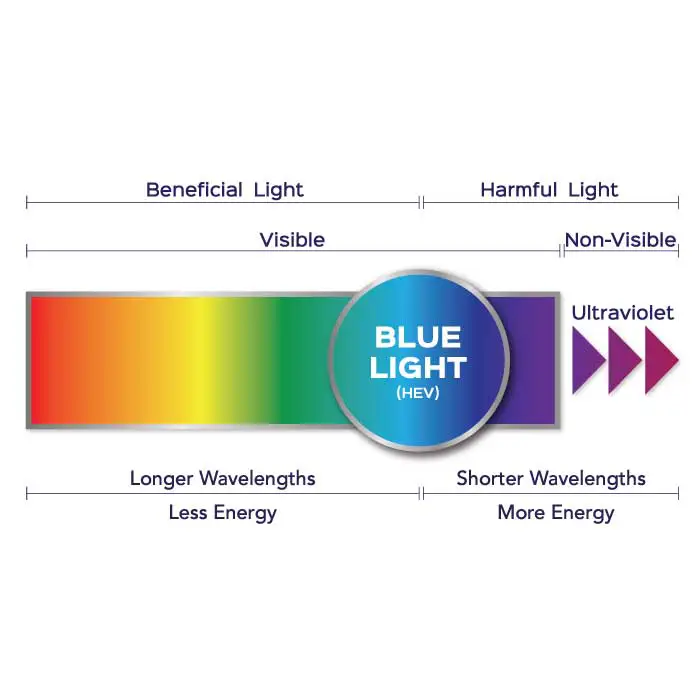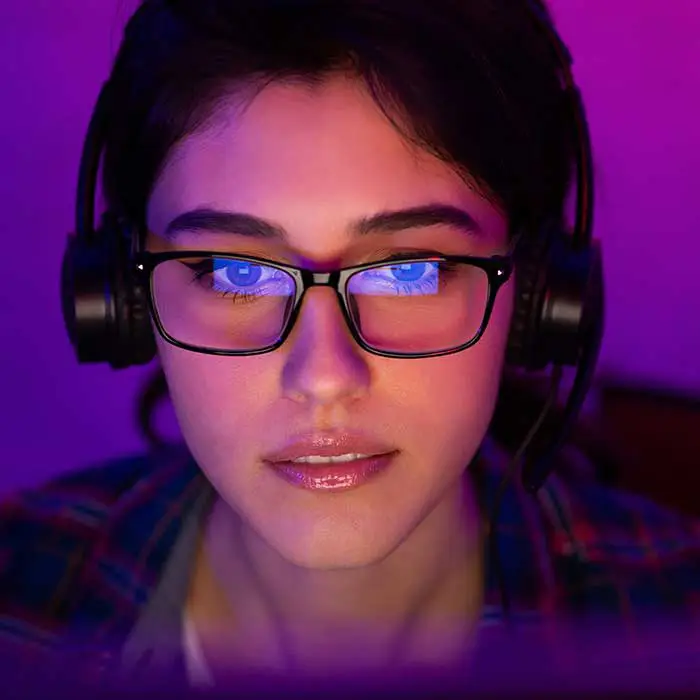
Blue Light Filter Glasses Provide Visual Comfort
Eyeglass lens coatings can improve lens performance, increase durability, and can improve the appearance of your new prescription lenses. Blue light filtering lens coatings can be beneficial for individuals that spend long hours using devices (i.e., computers, smartphones, tablets, etc.) and for individuals who want to enjoy screen time before bed without sacrificing their sleep quality. There may be several additional health benefits to wearing blue light filtering glasses, but presently, the body of research on blue light and its impact on ocular health (if any) is incomplete. Want to learn more? Visit our licensed opticians in Edmonton.
Schedule An Exam Our Optometrists
(780) 473-6123
Blue Light Filter Glasses.
What is Blue Light?
Sunlight or "white" consists of red, orange, yellow, green and blue light rays. Each colour of light represents an amount of energy and wavelength of electromagnetic radiation. Rays at the red end of the visible light spectrum have longer wavelengths and lower energy. In contrast, light rays at the blue end of the spectrum have shorter wavelengths and higher energy levels. This portion of the light spectrum is called High Energy Visible (HEV) light. Sunlight is the primary source of blue light, but many other sources, like smartphones, television, tablets, and computers, factor into HEV exposure. The amount of HEV light produced by digital devices is only a fraction of that emitted by the sun. However, the amount of use by, and proximity to, users have many eye care professionals concerned that blue light may have long-term effects on eye health.

Blue Light Glasses.
The Human Eye: Defenceless Against Blue HEV Light
The cornea and lens of the human eye are very effective at blocking UV rays from reaching the light-sensitive retina at the back of the eye. In fact, less than one percent of UV radiation from the sun reaches the retina, even if sunglasses are not being worn. However, this small perctentage can cause significant damage. Accordingly, sunglasses that block 100 percent of UV-A and UV-B light are essential to protect the eye from damage that could lead to cataracts, a pinguecula and/or pterygium, or cancer. In comparison, almost all visible blue light passes through the cornea and lens and reaches the retina.
Schedule A Blue Light Filtering Eyeglass Fitting
Blue Light Filtering Eyewear
Blue (HEV) Light Can Impact Sleep Quality & Duration
Extensive research has shown that blue light affects the body’s circadian rhythm - its natural wake and sleep cycle. During the day, blue light wakes us and stimulates the body. However, too much blue light exposure at night can make it difficult to fall asleep and keep asleep. Accordingly, individuals should limit their screen time during the two to three hours before heading to bed. Blue light filtering eyewear and nighttime settings on devices like phones, tablets, and computers can help minimize blue light exposure during evening hours. The most convenient option for minimizing HEV exposure is blue light filtering glasses. Many houses contain blue-white (5000K) and blue (6500K) lighting. Blue light filtering glasses limit HEV exposure no matter your location or activity, and they do not require you to remember to adjust settings.
Schedule A Blue Light Filtering Eyeglass Fitting
Blue Light Eye Protection.
Blue Light May Increase Risk of Macular Degeneration
The ability of blue HEV light to reach the retina (i.e., the back of the eye) unimpeded is noteworthy because laboratory studies have shown that excessive exposure to blue light can damage light-sensitive cells in the retina. The resulting changes to the retina resemble those that occur because of macular degeneration, a disease that can lead to permanent central vision loss. However, it is important to note that this research was conducted in vitro (i.e., in the lab) rather than on the living human eye. Therefore, more research is necessary to fully establish the real risks that blue light presents to eye health, if any at all.
Schedule A Blue Light Filtering Eyeglass Fitting
Protecting Your Eyes From Blue Light.
Blue Light Can Contribute To Eye Strain
Short-wavelength, high energy blue light is not easily focused because it scatters more easily than other visible light (e.g., red, yellow, etc.). Accordingly, computers, tablets, smartphones, televisions and other digital devices that emit significant amounts of blue light, can produce optical noise and distoration that reduces contrast and can result in eye strain. Eyeglass lenses that block blue light with wavelengths less than 450 nanometres (blue-violet light) can help improve contrast for many individuals. Accordingly, glasses with yellow-tinted lenses may increase comfort while using digital devices for extended periods of time.
Schedule A Blue Light Filtering Eyeglass Fitting
Blue Light Eye Protection.
Blue Light May Increase Nearsightedness
A small number of recent studies have produced results that suggest blue light can cause significant over accommodation, even with decreased brightness. Hypotheses also exist that this mechanism may also trigger night myopia (i.e., nearsightedness) and could be a potential driver in the myopic shift observed in the population in recent years. However, it is important to note that further research is required to confirm or dismiss these early findings and hypotheses.
Schedule A Blue Light Filtering Eyeglass Fitting
Blue Light Eyewear FAQs
*HEALTH CANADA NOTICE: Correlation of high energy blue light and the following diseases and disorders: retinal damage/degeneration/retinal degenerative disease, macular degeneration/age related macular degeneration (AMD), increased risk of certain types of cancers, heart disease, obesity and diabetes, glaucoma, permanent damage to eyesight, cataracts, sleep disorders, eye strain, and loss/reduction of vision has not been completely scientifically proven. Since many factors can cause these conditions, consumer caution is advised.
Eye-deology Vision Care is committed to properly advising patients based on fact-based, peer-reviewed research, while also being mindful that the body of scientific research is continuously growing and evolving on blue light and the potential impacts it may have on ocular health. Until further research is conducted, visual comfort should be the primary reason to choose blue light filtering lenses for your eyes.
Our Edmonton Optometrists
Searching for an optometrist in Edmonton? Our experienced Edmonton eye doctors use advanced modern technologies and devote upwards of 500% more time towards providing personalized patient care than elsewhere so that they can see more and ensure that you may never see less. Position yourself to see the future with a visit to our eye clinic and Edmonton's best eye care!

Dr. Jennifer Ash, OD
Dr. Jennifer Ash is the Resident Optometrist at Eye-deology Vision Care. Dr. Ash provides patient care 5 days a week. Read more about Dr. Ash.

Dr. Ruhee Kurji, OD
Dr. Ruhee Kurji is an Associate Optometrist at Eye-deology Vision Care. Dr. Kurji provides patient care Tuesdays & Fridays. Read more about Dr. Kurji.

Dr. Jade McLachlin, OD
Dr. Jade McLachlin is an Associate Optometrist at Eye-deology Vision Care. Dr. McLachlin provides patient care 5 days a week. Read more about Dr. McLachlin.

Dr. Tania Mathews, OD
Dr. Tania Mathews is an Associate Optometrist at Eye-deology Vision Care. Dr. Mathews provides patient care 2 days a week. Read more about Dr. Mathews.
Learn Why Our Edmonton Optometrists Are The Best!


